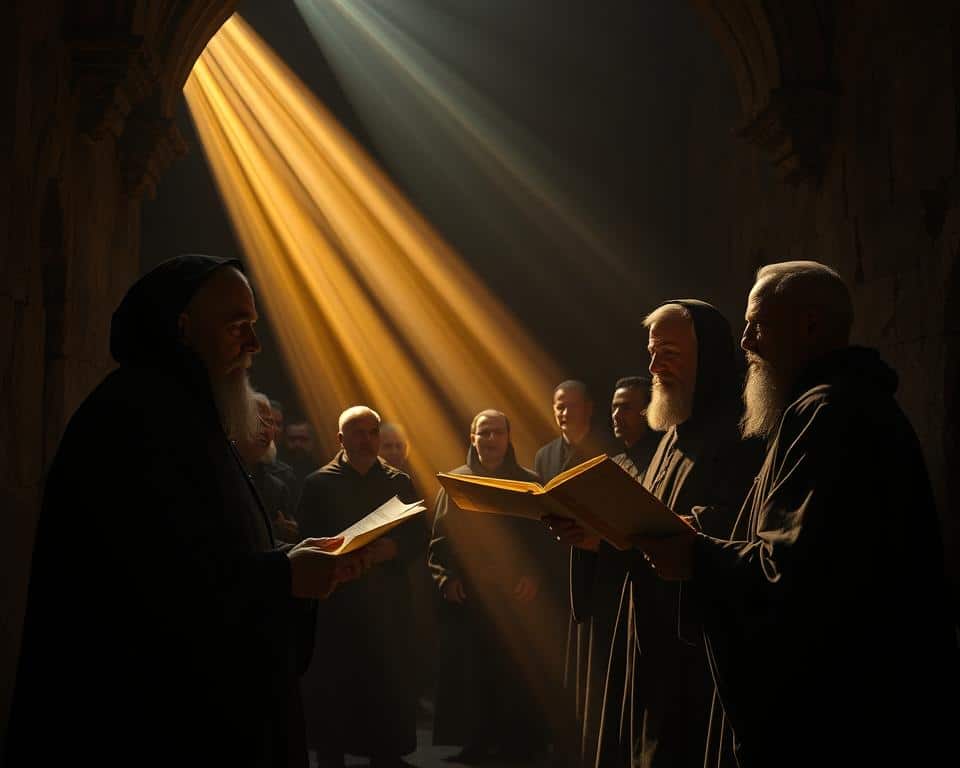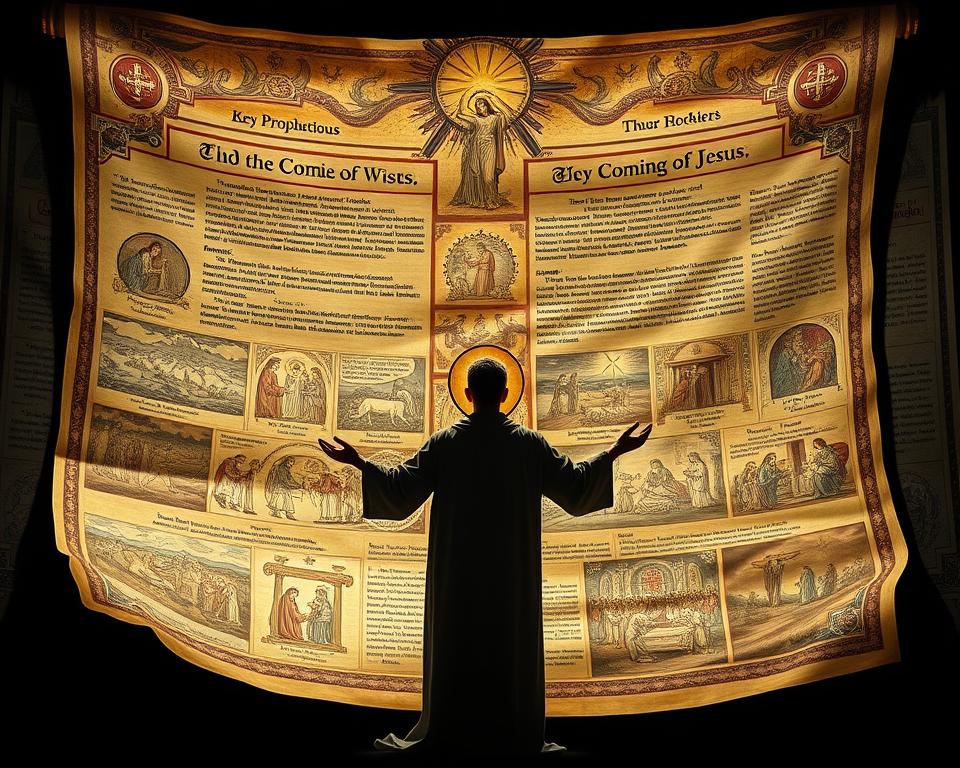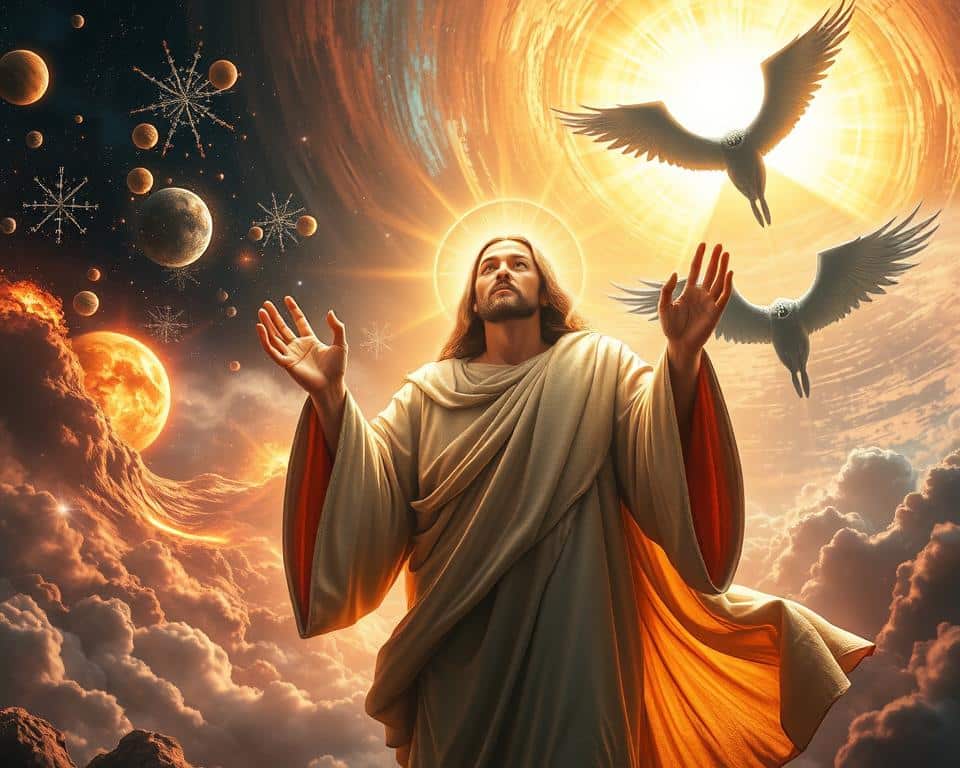Did you know the book of Psalms holds powerful clues about Jesus’ life, death, and resurrection? These ancient songs, written by King David and others, contain glimpses of God’s plan long before the New Testament was written. Jesus Himself confirmed this in Luke 24:44, showing how Scripture pointed to Him.
Exploring these connections deepens your faith and reveals God’s perfect timing. From the suffering of a righteous man to the triumph of a king, the Psalms weave a story that finds its fulfillment in Christ. Let’s uncover these truths together.
1. What Are Messianic Prophecies?
Long before Jesus walked the earth, Scripture revealed His coming. These divine clues, scattered across the Old Testament, form a cohesive narrative about God’s promised deliverer. Over 300 passages point to His life, death, and resurrection, offering hope to generations.

Definition and Importance
Messianic prophecies are God’s way of preparing humanity for Christ. They aren’t vague guesses—they’re specific, like Psalm 22’s description of crucifixion centuries before the method existed. This precision strengthens faith, showing Scripture’s divine origin. The numerous fulfilled prophecies in the New Testament further confirm the truth of these predictions. Each detail, from the lineage of Jesus to the events of His life, aligns with earlier scriptural writings, showcasing a divine orchestration that transcends time. This paints a clear picture of a cohesive narrative that elevates both the Old and New Testaments as part of a unified testimony to God’s plan for redemption.
Role in the Old Testament
Israel’s kings, like David, often reflected the Messiah’s dual role as sufferer and conqueror. For example:
- Kingship: Psalm 2 depicts God’s anointed ruler triumphing over rebellion.
- Suffering: Psalm 22 mirrors Jesus’ crucifixion, down to divided garments.
Early Christians used these texts to prove Jesus was the Messiah. The word became their foundation, bridging Testaments.
2. How Jesus Identified Messianic Psalms
Jesus Himself pointed to the Psalms as proof of His divine mission. After His resurrection, He opened His disciples’ minds to understand how this book of poetry foretold His life (Luke 24:44). The New Testament writers followed His lead, quoting Psalms over 20 times to show Jesus was the promised Savior.

Jesus’ Teachings in the New Testament
In Matthew 21:42, Jesus quoted Psalm 118:22-23: “The stone the builders rejected has become the cornerstone.” He revealed this verse was about Him—the rejected King. Even His zeal for God’s house (John 2:17) fulfilled Psalm 69:9, linking His actions to Scripture.
Key Scriptures Linking Psalms to Jesus
The apostles preached boldly using Psalms. Peter cited Psalm 16:10 in Acts 2:25-28, proving the holy one’s resurrection. Hebrews 1:5 echoed Psalm 2:7, declaring Jesus as God’s Son. Every quote reinforced God’s hand guiding history.
When you study these connections, you’ll see the Bible’s flawless unity. From suffering to victory, the Psalms praise His name and point to Christ.
3. Psalm 2: The Messiah as God’s Son
Psalm 2 reveals a divine conversation about God’s chosen King. Rages against His authority, yet the one He calls “Son” reigns supreme. This isn’t just poetry—it’s a blueprint for Christ’s identity and mission.
Prophecy of the Messiah’s Reign
Psalm 2:7 declares, “You are My Son; today I have begotten You.” The term “begotten” signifies unique divinity, not biological birth. Ancient kings like David reflected this title, but Jesus fulfilled it perfectly.
God laughs at earthly rebellion (v. 4), but His King rules with strength. The nations are His inheritance—a promise echoed in Revelation. Every word points to the day of His power.
Fulfillment in Jesus’ Baptism and Transfiguration
At Jesus’ baptism, God’s voice thundered: “This is My beloved Son” (Matthew 3:17). This direct quote from Psalm 2 confirmed Jesus’ divine role. Later, at the Transfiguration, the Father repeated this truth (Matthew 17:5).
Jesus’ authority surpasses David’s. While David ruled Israel, Christ reigns at God’s right hand (Acts 2:33–34). His kingdom is eternal, His acts unmatched. Scripture leaves no doubt—He is the Son Psalm 2 foretold.
“Ask of Me, and I will give the nations as Your inheritance.” —Psalm 2:8
4. Psalm 8: The Messiah’s Dominion Over Creation
Psalm 8 unveils a breathtaking vision of God’s plan for humanity—and Jesus fulfills it. This hymn of praise declares, “You crowned him with glory and honor, putting everything under his feet” (v. 5–6). At first glance, it speaks of mankind’s role. But Hebrews 2:9 reveals its deeper *interpretation*: Jesus, God’s *son*, stepped into humanity to reclaim what Adam lost.
Prophecy of Authority Over All Things
Psalm 8 celebrates God’s majesty in creation, from starry skies to rolling seas. Yet verse 6 hints at a greater reality: a *way* to restore humanity’s broken dominion. The *word* “everything” includes all creation—a promise Jesus affirmed when He calmed storms and healed diseases.
Fulfillment in Jesus’ Ministry and Hebrews 2
Hebrews 2:9 ties Psalm 8 directly to Christ: “We see Jesus… crowned with glory because He suffered death.” His *resurrection* proved His authority over sin and death. Now, as believers, we share in His reign (Ephesians 2:6). What Adam forfeited, Jesus restored.
“You made him ruler over the works of Your hands.” —Psalm 8:6
This isn’t just ancient poetry—it’s God’s blueprint for redemption. Trust His design. One *day*, every knee will bow to the King Psalm 8 foretold.
5. Psalm 16: The Messiah’s Resurrection
The empty tomb wasn’t just a miracle—it was a promise kept. Psalm 16:10 declares, “You will not abandon me to the realm of the dead, nor let Your holy one see decay.” David’s words found their ultimate fulfillment in Jesus, the son who conquered death.
Prophecy of Not Abandoning the Holy One to Decay
Ancient Near Eastern myths spoke of gods rising, but none matched Scripture’s precision. Psalm 16 predicted Jesus’ resurrection down to the fact His body wouldn’t decompose. Unlike pagan tales, this was God’s way of confirming His power over death.
Fulfillment in Jesus’ Resurrection
All four Gospels testify: the tomb was empty (Matthew 28:6, Mark 16:6, Luke 24:6, John 20:1–9). Jesus’ resurrection wasn’t symbolic—it was physical. His scars proved He was the same man who died, now alive forever.
This changes everything. Because He lives, you too will rise (1 Corinthians 15:20–22). The life He offers isn’t temporary; it’s eternal. Hold onto this hope—death isn’t the end.
“Because You will not abandon me to the grave, my body will rest in hope.” —Psalm 16:9–10
6. Psalm 22: The Messiah’s Suffering and Crucifixion
Centuries before the cross, a song of suffering pointed to Christ’s sacrifice. Psalm 22, written by David, describes crucifixion with eerie precision—though this method of execution didn’t exist in his time. Every detail, from pierced hands to divided garments, finds fulfillment in Jesus’ death.
Prophecy of Pierced Hands and Feet
Verse 16 declares, “They pierced my hands and my feet.” This mirrors John 19:37, where soldiers drove nails into Jesus’ flesh. Even the mocking crowd (Psalm 22:7–8) matches Matthew 27:39–43, where bystanders taunted Him.
David’s words weren’t poetic exaggeration. They were divine foreshadowing. Jesus quoted verse 1 on the cross—“My God, why have You forsaken Me?”—showing He was the holy son bearing humanity’s sin.
Fulfillment in the Gospels
John 19:24 cites Psalm 22:18: soldiers gambled for Jesus’ clothing. Verse 15 (“My strength is dried up”) aligns with His cry, “I thirst” (John 19:28). Scripture leaves no doubt: this was God’s plan.
Yet Psalm 22 doesn’t end in despair. Verse 27 promises, “All the ends of the earth will remember and turn to the Lord.” Jesus’ resurrection launched this global mission (Matthew 28:19).
“He has not despised the suffering of the afflicted.” —Psalm 22:24
What love! The King became the sacrifice, fulfilling every prophecy. His wounds bought our healing, His forsakenness brought us near. See His heart in Psalm 22—and worship.
7. Psalm 34: The Messiah’s Unbroken Bones
Roman execution methods couldn’t override God’s plan for the Messiah’s body. Psalm 34:20 declares, “He protects all his bones; not one of them will be broken.” This seemingly minor detail became a stunning fulfillment in Jesus’ *death*.
Prophecy of Physical Preservation
Romans practiced *crurifragium*—breaking legs to hasten *death*. Yet when soldiers approached Jesus, they found Him already dead (John 19:33). This wasn’t coincidence. As the Passover lamb (Exodus 12:46), His unbroken bones mirrored the *fact* that no lamb’s bones were to be cracked.
Fulfillment in Jesus’ Crucifixion
John 19:36 directly quotes Psalm 34:20, proving Jesus was the *son* who fulfilled it. His preserved body foreshadowed His resurrection—a whole, glorified form. Just as the lamb’s purity mattered, so did Christ’s bodily integrity.
This truth reminds us: God controls even the darkest *earth*ly events. Trust His Word. Every detail, down to bones, points to His faithfulness.
“Not one of His bones will be broken.” —Psalm 34:20
8. Psalm 110: The Messiah as Priest and King
God’s oath in Psalm 110 changes how we see Jesus forever. This psalm reveals Him not just as King but as Priest—a dual role no earthly leader could fulfill. David’s words point to Christ’s eternal ministry, sealed by divine promise.
Prophecy of Eternal Priesthood
Psalm 110:4 declares, “The Lord has sworn and will not change His mind: ‘You are a priest forever.’” Unlike temporary Levitical priests, Jesus’ priesthood is unbreakable. The oath (verse 4) underscores God’s unwavering plan.
Hebrews 5:6 quotes this book, proving Jesus’ priesthood surpasses Aaron’s. Melchizedek, a shadow of Christ, had no beginning or end—just like the Son’s ministry.
Fulfillment in Hebrews 5 and 7
Hebrews 7:17 repeats Psalm 110:4, tying Jesus’ resurrection to His eternal role. Death couldn’t stop Him; He lives to intercede for you (Hebrews 7:25). His victory at God’s hand secures your salvation.
What does this mean for you? Confidence. Jesus isn’t a distant ruler—He’s your Priest-King, bridging heaven and earth. Trust His perfect mediation, and let your life echo His praise.
“The Lord has sworn and will not change His mind: ‘You are a priest forever.’” —Psalm 110:4
9. Psalm 118: The Rejected Cornerstone
Palm branches waved as Jesus entered Jerusalem, setting the stage for prophecy. The crowds shouted “Hosanna!”—quoting Psalm 118:26—yet within days, their praise turned to cries for crucifixion. This irony reveals God’s perfect plan: the rejected son would become the cornerstone of salvation.
Prophecy of Rejection and Exaltation
Psalm 118:22–23 declares, “The stone the builders rejected has become the cornerstone.” Jesus referenced this verse (Matthew 21:42), revealing His mission. The very crowds who celebrated Him would soon demand His death.
Palm branches symbolized victory, but Jesus came as a humble king (Zechariah 9:9). His entry fulfilled two prophecies at once—showing Scripture’s precision. God’s acts in history are never accidental.
Fulfillment in Jesus’ Triumphal Entry
John 12:13 records the crowds shouting Psalm 118:26: “Blessed is He who comes in the name of the Lord!” Yet their fickle hearts mirrored Israel’s pattern—welcoming God’s promises but rejecting His way.
This moment foreshadowed Revelation’s climax, where “every knee will bow” (Philippians 2:10). One day, all the earth will acknowledge Christ as King without hesitation.
“This is the Lord’s doing; it is marvelous in our eyes.” —Psalm 118:23
Will you persistently honor Him? Trust God’s plan, even when the world rejects His truth. The cornerstone still stands—unshaken and eternal.
10. The Significance of Messianic Prophecies in Psalms
The book of Psalms is more than ancient poetry—it’s a roadmap to Christ. Over 50 passages reveal His birth, ministry, death, and resurrection with stunning accuracy. The odds of accidental fulfillment are beyond human calculation.
These verses aren’t coincidences. They prove Scripture’s divine origin. Early believers used them to share the gospel, knowing their power to transform hearts. Every detail, from pierced hands to unbroken bones, points to Jesus as the promised king.
Dive deeper into these passages. Let them strengthen your faith and fuel your worship. Share these truths—they’re God’s gift to a world needing hope. The New Testament confirms what Psalms foretold: Jesus is the holy one who reigns forever.





